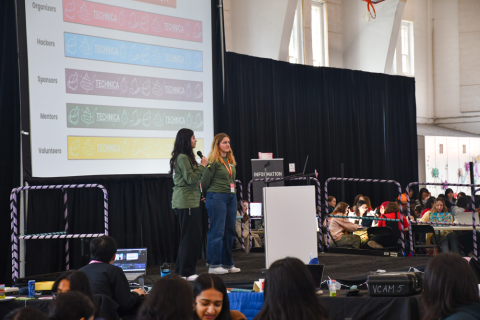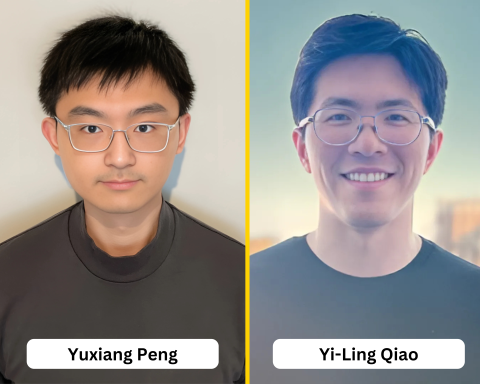Recent News & Accomplishments
2024
In the race for constant growth, many large language models (LLMs) focus on producing newer and better outputs. Sathvik Nair, a third-year linguistics doctoral student working in the Computational Linguistics and Information Processing (CLIP) Lab at the University of Maryland is taking different approach, examining how this technology operates and what it reveals about human cognition. Nair is deeply fascinated by the human mind. His research involves understanding and explaining human language processing and usage through advances in LLMs. By integrating advances in natural language... read more
The world's largest hackathon for underrepresented genders marks a decade of innovation at the University of Maryland.
The Reckord Armory at the University of Maryland transformed into a bustling hub of creativity on October 26 and 27, 2024, as Technica celebrated its 10th anniversary. The event, renowned as the world's largest hackathon for underrepresented genders, drew participants from around the region to collaborate, innovate and showcase their technological skills. Since its inception in 2015, Technica has grown from a student-run event into a significant platform for promoting diversity and inclusion in tech. This year, the hackathon attracted over 1,000 participants with the support of 22 sponsors... read more
Environmentally friendly, sustainable pesticides are popular with consumers, who are more likely to purchase sweet corn from their local market that hasn’t been sprayed with potentially harmful chemicals. Now, supported by a $650,000 grant from the U.S. Department of Agriculture (USDA), two University of Maryland researchers have teamed up to help ensure these pest-fighting methods remain on the table, in part by understanding why a common pest known as the corn earworm, or H. zea , has developed resistance to pesticides widely used in farming. The researchers— Megan Fritz , an associate... read more
University of Maryland alums, students, faculty and staff met up at the world’s largest conference for women and nonbinary technologists.
In the last 10 years, the number of undergraduate women in computing majors at the University of Maryland climbed from less than 100 to more than 2,400. This growth extends to graduate students, where women now make up 38% of graduate students in computing programs. As these numbers increased, so too has UMD’s community of women in tech. In October 2024, UMD convened that community of alums, students and staff at the Grace Hopper Celebration of Women in Computing (GHC)—a conference that brings the research and career interests of women in computing to the forefront. The Department of Computer... read more
James Purtilo emphasizes how the CrowdStrike incident reveals national security vulnerabilities, with attackers using AI to outpace cybersecurity defenses.
This past summer’s “CrowdStrike incident” – which began as a “minor” error – came as close to a total system crash as the world has yet seen. It grounded airlines, hospitals were forced to cancel surgeries, and retailers couldn’t process digital payments. The issue was made worse because though a patch was quickly released, it required every single computer impacted to be manually restarted. However, just months later there are signs that it was a wakeup call for IT and cybersecurity specialists. Instead of ignoring the issue and hoping it was an isolated incident – as has happened following... read more
He was recognized for his patent on multimodal emotion recognition.
University of Maryland Distinguished University Professor Dinesh Manocha has been awarded the 2024 Jimmy Lin Award for Innovation and Invention . Manocha, who holds joint appointments in the Department of Computer Science and the Department of Electrical & Computer Engineering , was honored for his patent, "System and Method for Multimodal Emotion Recognition." The award recognizes individuals who have transformed their ideas into innovations through invention and technology commercialization. The Jimmy Lin Endowment for Innovation and Invention annually presents the award to faculty,... read more
UMD experts explain the emotional and cognitive challenges, offering strategies to avoid them.
Artificial though it may be, the concept of “intelligence” doesn’t seem to jibe with a computer-generated image of uniformed cats toting assault rifles. Yet that visual slur, which supports a debunked story about immigrants in Ohio eating pets, has become a signature image from the 2024 U.S. presidential election. It was created using artificial intelligence (AI) by supporters of Republican nominee Donald Trump and circulated online by the former president himself. As the first election to play out in the era of widespread access to generative AI—which can create seemingly original content—... read more
Yuxiang Peng and Yi-ling Qiao each received the award for the 2024–25 academic year.
The University of Maryland’s Department of Computer Science has announced the recipients of the 2024-25 Larry S. Davis Doctoral Dissertation Award. Yuxiang Peng (Ph.D. '24, computer science), who will join Purdue University in fall 2025, and Yi-ling Qiao, a fifth-year computer science Ph.D. student in UMD’s GAMMA Group , received the award, which recognizes dissertations for their technical depth, significance, potential impact and presentation quality. Named after Professor Emeritus Larry S. Davis , the award honors students who showcase innovative work in computer science. Davis, who served... read more
Laxman Dhulipala secures grant to develop open-source tools for enhanced data analysis through clustering algorithms.
Modern datasets are massive—they can contain billions of values and an overwhelming amount of information. The data itself is invaluable and can provide vital insights, but how can we efficiently make sense of it? Laxman Dhulipala , an assistant professor of computer science with a dual appointment in the University of Maryland Institute for Advanced Computer Studies (UMIACS), is building open-source tools to help researchers do just that. He is part of a multi-institutional team that has been awarded $364K from the National Science Foundation to help us better understand complex data using... read more
The ABC show’s first lead highlights dating in later years.
Before she was handing out roses to 24 eligible suitors at the famous Bachelor Mansion, the dating scene for Joan Vassos (B.S. ’85, computer science) consisted of Delta Gamma formals or meetups at College Park bars. The University of Maryland alum last fall appeared on the debut season of “The Golden Bachelor,” a senior spinoff of ABC’s long-running series “The Bachelor,” where contestants vie for the affections of the lead—and often a proposal. After leaving the show early to help a daughter struggling with postpartum depression, Vassos was named the first “Golden Bachelorette,” relishing... read more









